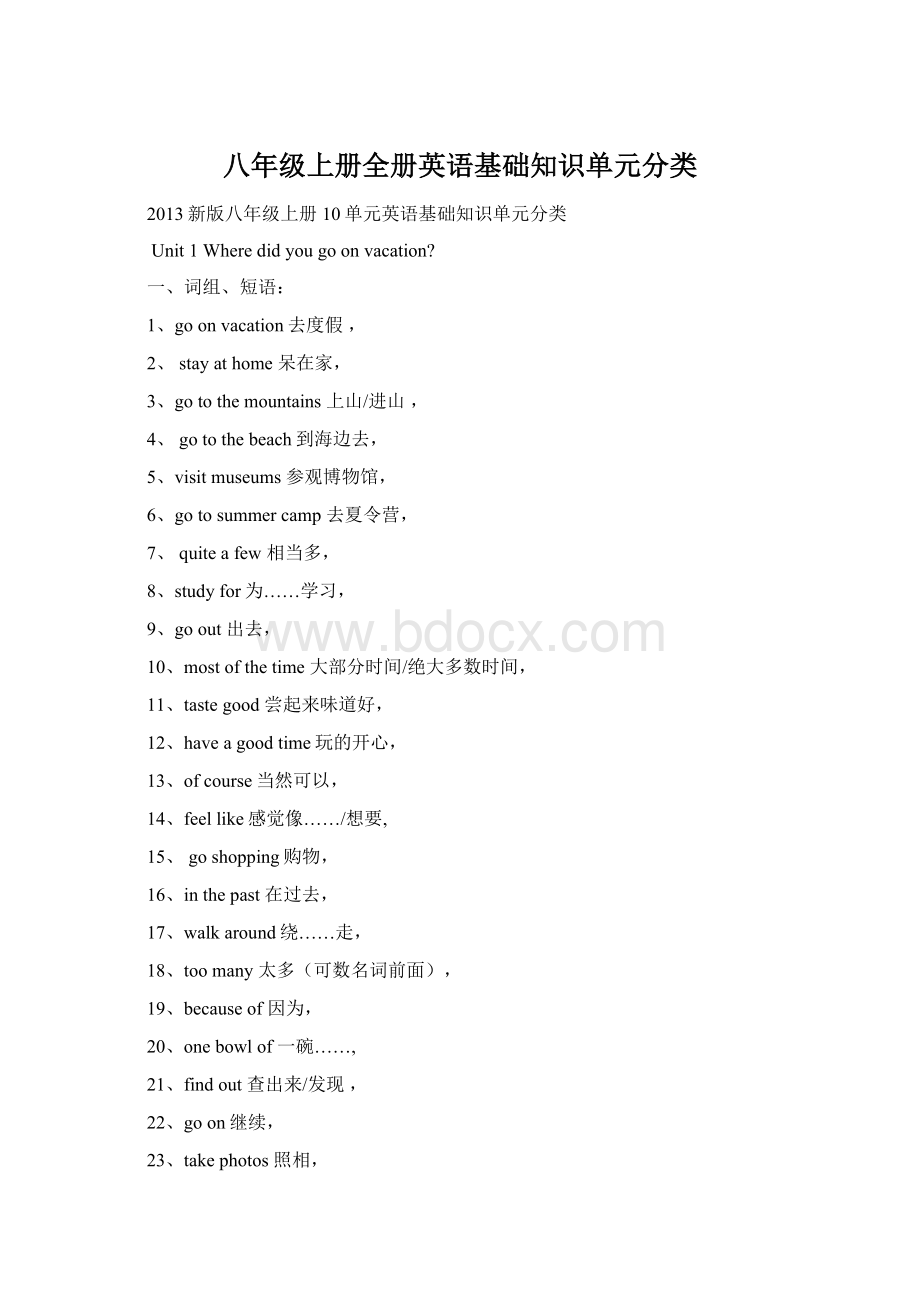八年级上册全册英语基础知识单元分类.docx
《八年级上册全册英语基础知识单元分类.docx》由会员分享,可在线阅读,更多相关《八年级上册全册英语基础知识单元分类.docx(34页珍藏版)》请在冰豆网上搜索。

八年级上册全册英语基础知识单元分类
2013新版八年级上册10单元英语基础知识单元分类
Unit1Wheredidyougoonvacation?
一、词组、短语:
1、goonvacation去度假,
2、stayathome呆在家,
3、gotothemountains上山/进山,
4、gotothebeach到海边去,
5、visitmuseums参观博物馆,
6、gotosummercamp去夏令营,
7、quiteafew相当多,
8、studyfor为……学习,
9、goout出去,
10、mostofthetime大部分时间/绝大多数时间,
11、tastegood尝起来味道好,
12、haveagoodtime玩的开心,
13、ofcourse当然可以,
14、feellike感觉像……/想要,
15、goshopping购物,
16、inthepast在过去,
17、walkaround绕……走,
18、toomany太多(可数名词前面),
19、becauseof因为,
20、onebowlof一碗……,
21、findout查出来/发现,
22、goon继续,
23、takephotos照相,
24、somethingimportant重要的事情,
25、upanddown上上下下,
26、comeup出来
二、重要句子(语法):
Wheredidyougoonvacation?
你到哪里去度假了?
IwenttoNewYorkCity.我去了纽约城
Didyougooutwithanyone?
你出去带人吗?
No,Noonewashere.Everyonewasonvacation.不,没有人在这儿。
大家度去度假了。
Didyoubuyanythingspecial?
你买了什么特别的东西吗?
Yes,Iboughtsomethingformyfather.对,我给父亲买了一些东西。
Howwasthefood?
食物怎么样?
Everythingtastedreallygood.每一样东西真的都好吃。
Dideveryonehaveagoodtime?
大家玩的开心吗?
Oh,yes.Everythingwasexcellent.对,一切都很精彩。
三、习惯用法、搭配
1.buysth.forab./buysb.sth.为某人买某物2.taste+adj.尝起来……
3.nothing….but+V.(原形)除了……之外什么都没有
4.seem+(tobe)+adj看起来5.arrivein+大地方/arriveat+小地方到达某地
6.decidetodosth.决定做某事7.trydoingsth.尝试做某事/trytodosth.尽力做某事
8.enjoydoingsth.喜欢做某事9.wanttodosth.想去做某事
10.startdoingsth.开始做某事11.stopdoingsth.停止做某事
12.look+adj看起来13.dislikedoingsth.不喜欢做某事
14.Whynotdosth.为什么不做…….呢?
15.so+adj+that+从句如此……以至于……
16.tellsb.(not)todosth.告诉某人(不要)做某事17.keepdoingsth.继续做某事
18.forgettodosth.忘记去做某事/forgetdoingsth忘记做过某事
四、词语辨析:
1.anywhere与somewhere两者都是不定副词。
anywhere在任何地方,常用于否定句和疑问句中。
Ican’tfinditanywhere.
somewhere在某处,到某处,常用于肯定句。
Ilostmykeysomewherenearhere.
2.seem+形容词看起来…..Youseemhappytoday.
seem+todosth.似乎、好像做某事Iseemtohaveacold我好像感冒了。
Iseems/seemed+从句看起来好像…;似乎….Itseemsthatnoonebelieveyou.
seemlike….好像,似乎…..Itseemslikeagodidea.
3.decidetodosth.决定做某事Theydecidetovisitthemuseum.
decide+疑问词+动词不定式Hecannotdecidewhentoleave.
4.startdoingsth=starttodosth.开始,可与begin互换。
Hestarteddoinghishomework.
但以下几种情况不能用begin.
1)创办,开办:
Hestartedanewbookshoplastmonth.
2)机器开动:
Ican’tstartmycar.
3)出发,动身:
Iwillstarttomorrowmorning.
5.over介词,多于,超过,在…以上(表示数目、程度)=morethan
Myfatherisover40yearsold.
在…之上,与物体垂直且不接触,与under相反。
Thereisamapovertheblackboard.
超过:
Ihearthenewsovertheradio.
遍及:
Iwanttotravelallovertheworld.
6.toomany太多,后接可数名词复数:
Motherboughttoomanyeggsyesterday.
toomuch太多,修饰不可数名词,修饰动词作状语。
Wehavetoomuchworktodo.Don’ttalktoomuch.
muchtoo太,修饰形容词或副词。
Thehatismuchtoobigforme.You’rewalkingmuchtoofast.
分辨三者的口诀:
toomuch,muchtoo,用法区别看后头:
much后接不可数,too后修饰形或副。
toomany要记住,后面名词必复数。
7.becauseof介词短语,因为,由于,后接名词、代词或动名词,不能接句子。
Hecan’ttakeawalkbecauseoftherain.
because连词,因为,引导状语从句,表示直接明确的原因或理由。
Idon’tbuytheshirtbecauseitwastooexpensive.
Unit2Howoftendoyouexercise?
一、词组、短语:
1、helpwithhousework帮助做家务活,
2、goshopping购物,
3、onweekends在周末,
4、howoften多久一次,
5、hardlyever几乎不,
6、onceaweek每周一次,
7、twiceamonth每月二次,
8、gotothemovies去看电影,
9、everyday每天,
10、usetheInternet上网/用网,
11、befree有空,
12、havedanceandpianolessons上舞蹈钢琴课,
13、swingdance摇摆舞
14、playtennis打网球,
15、stayuplate熬夜,
16、atleast至少,
17、gotobedearly早睡,
18、playsports锻炼身体,
19、begoodfor对…有好处,
20、gocamping去野营,
21、inone’sfreetime在某人的空闲时间,
22、not….atall根本不,
23、themostpopular最流行,
24、suchas例如,
25、gotothedentist去看牙医,
26、morethan超过/多于,
27、Oldhabitsdiehard.旧习惯难改。
28、hard=difficult困难的,
29、lessthan少于/不到
二、重要句子(语法):
Whatdoyouusuallydoonweekends?
你周末通常做什么?
Ialwaysexercise.总是锻炼身体。
Whatdotheydoonweekends?
他们周末干什么?
Theyoftenhelpwithhousework.他们经常帮助干家务活。
Whatdoesshedoonweekends?
她周末干什么?
Shesometimesgoesshopping.她有时购物。
Howoftendoyougotothemovies?
你多久看电影一次?
Igotothemoviesmaybeonceamonth.可能一个月看一次。
HowoftendoeshewatchTV?
他多久看电视一次?
HehardlyeverwatchesTV.他几乎不看电视。
Doyougoshopping?
你购物吗?
No,Inevergoshopping.不,我从来就不购物。
三、习惯用法、搭配
1.helpsb.withsth帮助某人做某事
2.Howabout…?
=Whatabout…?
….怎么样?
/….好不好?
3.wantsb.todosth.想让某人做某事
4.Howmany+可数名词复数+一般疑问句….有多少…..
5.主语+find+that从句…发现…
6.It’s+adj.+todosth.做某事是….的
7.spendtimewithsb.和某人一起度过时光
8.asksb.aboutsth.向某人询问某事
9.bydoingsth.通过做某事
10.What’syourfavorite…..?
你最喜欢的……是什么?
11startdoingsth.开始做某事
12.thebestwaytodosth.做某事的最好方式
四、词语辨析
1.howoften多久一次,用来提问动作发生的频率。
回答用:
once,twice,threetimes等词语。
Howoftendoyouplaysports?
Threetimesaweek.
howlong多长,用来询问多长时间,也可询问某物有多长。
HowlongdoesittaketogettoShanghaifromhere?
Howlongistheruler?
howfor多远,用来询问距离,指路程的远近。
Howfarisitfromheretothepark?
It’sabout2kilometers.
2.free空闲的,有空的,反义词为busy.befree有空,闲着,相当于havetime.
I’llbefreenextweek.=I’llhavetimenextweek.
还可作“免费的、自由的”解。
befreetodosth.自由地做某事。
Theticketsarefree.You’refreetogoortostay.
3.Howcome?
怎么会?
怎么回事?
表示某件事情很奇怪,有点想不通;可单独使用,也可引导一个问句,相当于疑问句why,但howcome开头的特殊疑问句使用的仍然是陈述语序。
HowcomeTomdidn’tcometotheparty?
=Whydidn’tTomcometotheparty?
4.stayuplate指“熬夜到很晚,迟睡”。
Don’tstayuplatenexttime.
stayup指“熬夜,不睡觉”。
Hestayedupallnighttowritehisstory.
5.gotobed强调“上床睡觉”的动作及过程,但人不一定睡着。
Iwenttobedatelevenlastnight.
gotosleep强调“入睡,睡着,进入梦乡”。
Shewassotiredthatshewenttosleepsoon.
6.find+宾语+名词,发现:
Wehavefoundhim(tobe)agoodboy.
find+宾语+形容词,发现:
Hefoundtheroomdirty.
find+宾语+现在分词,发现:
Ifoundherstandingatthedoor.
7.percent百分数,基数词+percent:
percent没有复数形式,作主语时,根据所修饰的名词来判断谓语的单复数。
Fortypercentofthestudentsinourclassaregirls.Thirtypercentoftimepassed.
8.morethan超过,多于,不仅仅,相当于over.在句型转换中考查两者的同义替换。
反义词组为:
lessthan.IlivedinShanghaiformorethan/overtenyears.
9.afraid形容词,担心的,害怕的,在句中作表语,不用在名词前作定语。
I’mafraidwecan’tcomehereontime.
beafraidofsb/sth害怕某人/某事;beafraidofdoingsth.害怕做某事。
Somechildrenareafraidofthedark.Don’tbeafraidofaskingquestion.
I’mafraid+从句,恐怕,担心:
I’mafraidIhavetogonow.
10.sometimes,sometime,sometimes,sometime的区别:
sometimes频度副词,有时。
表示动作发生的不经常性,多与一般现在时连用,可位于句首、句中或句末。
SometimesIgetupveryearly.------Howoftendoyougetup?
sometime副词,某个时候。
表示不确切或不具体的时间,常用于过去时或将来时,对它用疑问词when.
IwillgotoShanghaisometimenextweek.------WhenwillyougotoShanghainextweek?
sometimes名词词组,几次,几倍。
其中time是可数名词,对它提问用howmanytimes.
Ihavereadthestorysometimes.-------Howmanytimeshaveyoureadthestory?
sometime名词短语,一段时间.表示“一段时间”时,句中谓语动词常为延续性动词,提问时用Howlong.
I’llstayhereforsometime.-----Howlongwillyoustayhere?
Unit3I’mmoreoutgoingthanmysister
一、词组、短语:
1.moreoutgoing更外向/更开朗,
2.as...as...与……一样,
3.thesingingcompetition歌咏比赛,
4.themostimportant最重要的,
5.betalentedinmusic在音乐方面有天赋,
6.thesameas与……相同
7.careabout关心/留意/关注,
8.bedifferentfrom与…不同,
9.belikeamirror像一面镜子,
10.aslongas与…一样长,
11.bringout显示/显出/生产/带来,
12.getbettergrade取得好成绩,
13.reachfor伸手达到/达到
14.touchone’sheart感动,
15.infact事实上,
16.makefriends交朋友,
17.begoodat在某方面成绩好,
18.theother另一个,
19.besimilarto对…熟悉,
20.begoodwith与…和睦相处
二、重要句子(语法):
BothSamandTomcanplaythedrums,butSamplaysthembetterthanTom.
That’sTara,isn’tit?
Areyouasfriendlyasyoursister?
I’mshysoit’snoteasyformetomakefriends.
三、习惯用法、搭配
1.havefundoingsth.享受做某事的乐趣
2.wanttodosth.想要做某事
3.as+形容词或副词的原级+as与…一样…
4.begoodatdoingsth擅长做某事
5.makesb.dosth.让某人做某事
6.It’s+形容词+forsb.Todosth..对某人来说,做某事是……的
语法:
IsTomsmarterthanSam?
汤姆比萨姆更聪明吗?
No,heisn’t.SamissmarterthanTom.不是,萨姆比汤姆更聪明。
IsTaramoreoutgoingthanTina?
Tara比Tina更开朗吗?
No,sheisn’t.TinaismoreoutgoingthanTara.不是,Tina比Tara更开。
Areyouasfriendlyasyoursister?
你与你的姐姐一样友好吗?
No,I’mnot.I’mfriendlier.不是,我更友好。
DoesTaraworkashardasTina?
Tara与Tina一样学习认真吗?
Yes,shedoes.是的。
Who’smorehardworkingatschool?
在学校谁更勤奋?
Tinathinkssheworksharderthanme.Tina认为她比我更努力。
四、词语辨析laughv.&n.笑
Wealllaughedloudlywhenshemadeajoke.她说了个笑话,我们都大声笑起来。
Wealllaughedathisjoke.听了他的笑话我们都笑起来。
Helaughsbestwholaughslast.谁笑在最后,谁笑得最好。
/不要高兴得太早。
(与at连用)嘲笑
Don’tlaughathim.别嘲笑他。
Peoplehaveoftenlaughedatstoriestoldbyseamen.人们常常嘲笑海员所讲的故事。
Everyonelaughedathisfoolishantics.大家都笑他那种愚蠢的滑稽动作。
笑;笑声Wehadagoodlaughathisjoke.我们被他的笑话逗得哈哈大笑。
thoughconj.虽然;纵然;即使;尽管=although
Thoughitwasraining,hewentthere.虽然当时正下着雨,他还是到那里去了。
Thoughhewaspoorhewashappy.虽然他很穷却很快乐。
注意:
不能受汉语的影响,在though引导的从句后使用but。
如:
Thoughhewaspoor,buthewashappy.(误)
thoughadv..不过,可是,然而,常用于句末,用逗号隔开。
Jimsaidthathewouldcome,hedidn’t,though.
语法讲解:
形容词与副词的比较级
大多数形容词(性质形容词)和副词有比较级和最高级的变化,即原级、比较级和最高级,用来表示事物的等级差别。
原级即形容词的原形,比较级和最高级有规则变化和不规则变化两种。
1.规则变化
单音节词和少数双音节词,加词尾-er,-est来构成比较级和最高级。
构成法
原级
比较级
最高级
一般单音节词末尾加-er,-est
tall(高的)
great(巨大的)
taller
greater
tallest
greatest
以不发音的e结尾的单音节词和少数以-le结尾的双音节
词只加-r,-st
nice(好的)
large(大的)
nicer
larger
nicest
largest
以一个辅音字母结尾的闭音节单音节词,双写结尾的辅
音字母,再加-er,-est
big(大的)
hot(热的)
bigger
hotter
biggest
hottest
“以辅音字母+y”结尾的双音节词,改y为i,再加-er,
-est
easy(容易的)
busy(忙的)
easier
busier
easiest
busiest
少数以-er,-ow结尾的双音节词末尾加-er,-est
clever(聪明的)
narrow(窄的)
cleverer
narrower
cleverest
narrowest
其他双音节词和多音节词,在前面加more,most来构成比较级和最高级
important(重要的)
easily(容易地)
moreimportant
moreeasily
mostimportant
mosteasily
2.不规则变化
原级
比较级
最高级
good(好的)well(健康的)